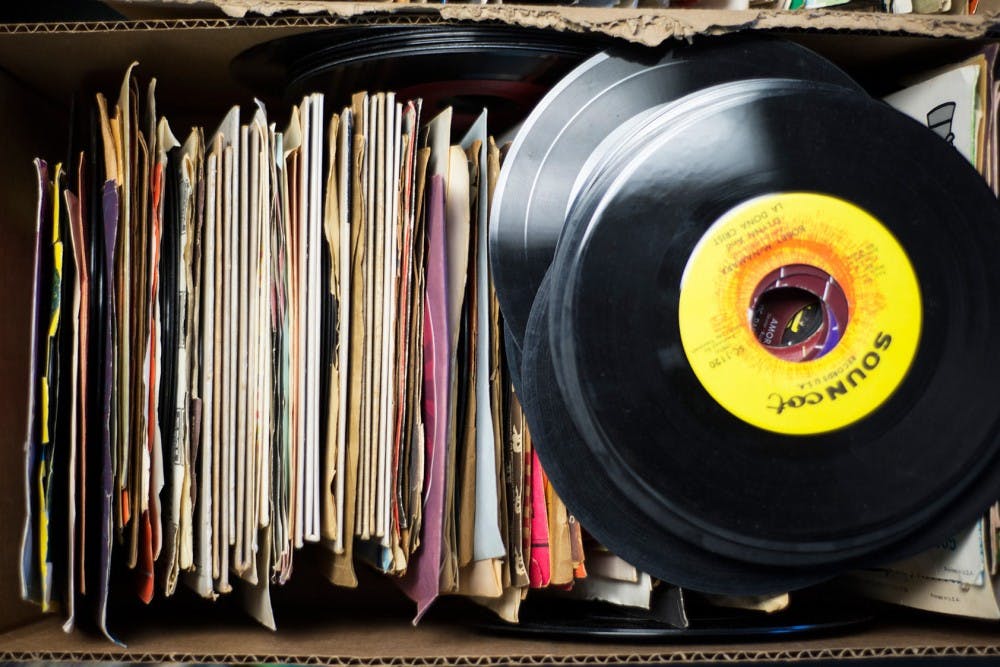Even with celebrations like Record Store Day, independent record stores are feeling the weight of the influence and power of major record labels
In the age of digital media and streaming, music can be chosen and listened to in a matter of seconds. But some listeners prefer a more dated, slower and involved approach.
Record Store Day, which was founded in 2007 and falls on the third Saturday of April, is a celebration of local and independent music retailers through the limited releases of new and old vinyl records throughout the nation. It will take place this Saturday.
“The focus is on the brick-and-mortar store, the ones that are actually selling music, slugging it out,” said Andrew Lampela, co-owner of Haffa’s Records.
Lampela said the store sees a large influx of customers on Record Store Day, even some from outside of Athens.
“It’s definitely a huge day for us,” he said. “It’s awesome to watch people freak out about records.”
What seems like outdated technology is actually making a comeback; in 2014, vinyl records saw a 52 percent increase in sales from the previous year, and now make up six percent of all physical album sales, according to the 2014 Nielsen Music Report.
{{tncms-asset app="editorial" id="0d6f41c6-da74-11e4-b8cf-332ea5c312a7"}}
Having a physical copy of an album is desirable to collectors, as vinyl records offer a large canvas space for album art, as well as inserts such as additional artwork or lyric sheets inside of the sleeve.
“It’s just a different dynamic,” said Lexie Pritchard, a freshman studying music production. “I like holding something tangible, something that you know the artist has worked on — something the artist has produced versus just an mp3 file.”
Jon Norstrom, a senior studying sociology and psychology, said even the process of shopping for records is enjoyable.
“I love the feeling of leafing through records,” he said. “Looking through all of them, seeing all the album covers. … Record stores are always a really good environment to hang out in.”
The mystery that comes with buying a record from an unknown artist is another enticing factor.
“Sometimes you don’t necessarily find exactly what you’re looking for at the store,” Norstrom said. “You just buy something that’s not totally in your normal comfort zone; you go home and put it on and actually like it. It helps you expand what you listen to.”
But even with the resurgence of popularity and celebrations like Record Store Day, independent record stores are still struggling.
“It’s a very small level of people that are still into the actual medium,” Lampela said. “It’s a bubble, for sure. There’s no way it’s going to sustain what it is now.”
Record Store Day has also faced criticism that it hurts the very people it was intended to help.
Lampela said that even after ordering his selection of limited releases for the store in January, there is no way of knowing what he will actually receive until the shipment comes in, just days before Record Store Day.
“I love the day; it’s a great day, and it’s great in theory,” he said. “But as a business practice, when you’re putting out a record that everyone wants in an amount of 500, there’s what, 1,400 stores listed participating? Even if you put it out in a limited edition of 1,400, each store is only going to get one. There’s definitely a huge flaw in the way it’s executed.”
{{tncms-asset app="editorial" id="6e5486e4-e30d-11e4-a45a-c3a5eb0165c4"}}
Due to the nature of the production of vinyl records, releases are limited to “pressings” of a particular album, which means records can generally only be produced in batches of a limited number of copies.
“There are records that are put out now that aren’t (for) Record Store Day that are in between pressings now that I just can’t get for people because U2 needs to pop out some crappy-ass record on Record Store Day,” Lampela said. “All the major labels are sucking up all the pressing time.”
While the idea of Record Store Day is good in theory, Lampela says it would benefit from a fresh start.
“If they’re trying to suck in record stores to participate in it, you should think about them instead of blowing Bono for another crappy record pressing.”
While he enjoys his work as the co-owner of Haffa’s for seven years and an employee for 15, Lampela has seen his fair share of frustration from the industry.
“I don’t have much hair left,” he sad. “But if I did I would rip most of it out.”
@seanthomaswolfe






